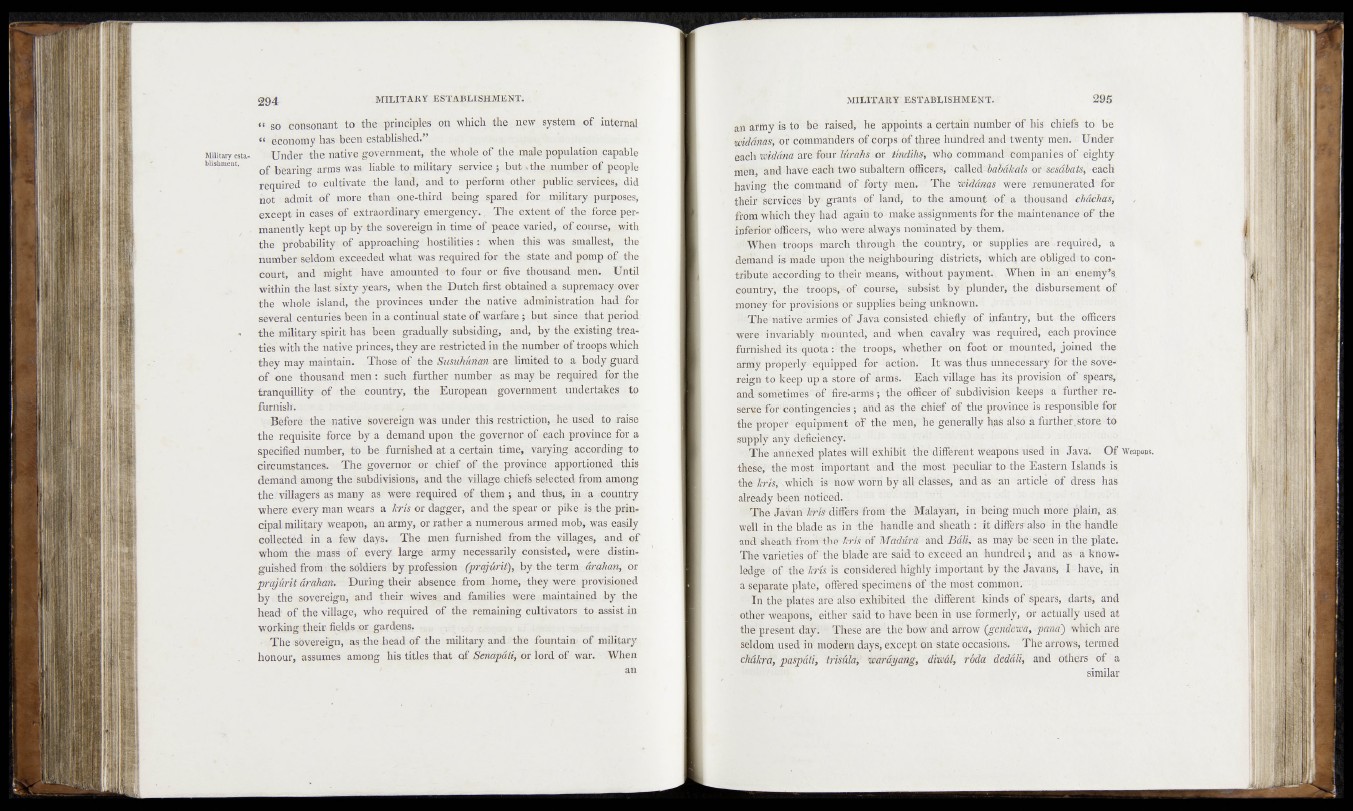
M go consonant to the principles on which the.new system of internal
“ • economy has been established.”
Military esta- Under the native:government, the whole of the male population .capable
biishment. Qf bearing arms was, liable ,tp: military service; buti»the;Snumhër of people
required to . cultivate the land, and to perform other {.public services, did
hot admit of more than one-third being spared for military rpqyposes,
except in cases-Of extraordinary emergency», The extent of the forcoiper-
, manently kept up by The sovereign in time of peace varied,) of course, ,\with
the probability of approaching ' hostilities ; when This was smallest,.. the
number seldom exceeded what was required? for the state and pomp of, the
court, and might have amounted-to four or .five thousand me,B.,...Until
within the last;sixty years, when the Dutch first obtained a supremanysover
the whole island, the provinces under the native administration had, for
several centuries been in a continual state of warfare ; but .since that period
« the military spirit has been gradually subsiding, and, by .the existing, treaties
with the nativè princes; they are restricted ia the number oTtroops which
they may maintain. .Those of the SusuMnan are,limited' to.,a= hady»guard
of one thousand men : such further number as, may'be required for the
tranquillity; of the country, the European government undertakes - to
fiirnish'. _ .
Before the native sovereign was under this restriction, ghe.;,used ,to. .raise
the requisite force by a demand upon the • governor, pf*each province for a
specified number, to be .furnished at a certain time,, varying- according--to
circumstances. The. governor or chief of the province apportioned this
demand among the [ subdivisions; and the village».chiefSiSele£ted>. from among
the-villagers as many as were required .of them ; and thus* ip, a, <pountry
where every man wears a kris Or dagger, and the spear or pikij»is. the principal
militaiy weapon; an army, or rather a numerous-armed möh*<r¥£as.ea§dy
collected, in a few days. The men fu,rnished from the -villages, and of
whom thc ixnass : of everyl lar^e army necessarily consisted* -were -distinguished
fromithe soldiers by profession (prÿûrit), by t h e - , t e r m ' or
prqjûritârahan." During their absence fromJiome, théy weré. provisioned
by. thé sovereign,? and their wives.-, and families were .maintained by;the
head* of the village* who required of the remaining cultivators to assist in
working thgin fields-,or;gardensf g| ,
■ The csbvereign, as; the head of the military and the fountain» of military
honour, assumes among his titles that of Scnapati, or lord of war. When
an
an army is to hè- raised* he appoints, a certain number óf his chiefs to b©
tà'idânas', or commanders of corps-óf three hiind,red and twenty- men. ■' Under
each widana w&'iouTi%r,dhs » of tmdïhs', who commandi'tSompanieS'tof eighty
mén, and »haVe each two 'siibâkern- officers,-' csS^eh^baBâkfdls m^sesldbats, each
having' the »eomtnahd! of -forty'»mén. ! The dàidârcas were remunerated' for
thilF&eWifcesMby* grands of land* to'the.'-amount tof,««, Thousand châchas, ,
from which they had1- again-to- make 'a s s ig nm e n ts thé' maintenance :of the
ifjfôfiôrofficer s^whö'Hrófé always nominated by»-them, ■-
iJlWhen Ttoo^-foikrch -through/the öoüntry, or supplies arei. required, a
lAand-is made upofi'Wé^^^hbbùring-'distriôte; »whjeh-are obliged* to con*
tribute âècôfding to'tiïéir 'tnearis, -without payaient;. Wheh tn.’aïu emefny?s.
country*--tiië 'troop's, «of* course, i'shbsist bÿ-' plunder; the • disbursement of ,
money* for provision’s or suppliés beihg tinknown. ;
»b.Tïie-'nâtivè armies5 of Java cötfsióte&ï chiefly Kof» infantry,' but-'the officers
were invariably* rfiöunted,'-'an&'whén cavalry vtits1 required; »each province
fumishedfks quota V-thUTroops, whether op,1 !foot or^ mounted/»joined the
army prépèfly- eqiiippëâ- for -afctiön.* ' I f was thus •Unnecessary for the sovh-1
nagUTo keep up a store-of arms. E’ach village has itslprovirion -of” sp'earsj
and- »soîrfetînÆs ''Sfi;flré'-arifîé<; the' officer óf'Subdivision keeps a ‘JkftHerire-
ser^'ïoFfeëhtiiigé'ncieë ; and as^flfeddiièf óf'the province is respönsible-for
tlîe'proper ' e^ui^Sfient b f the1 men, he generally h.as aMo à further,store To
supply aüy oeè'ficien'cÿî^1*1
o ^ h e vàrinei‘ëd1 plates- will ëxhib'it tiïe-different weàpons-hiéeâuinc Java. Of Weapon»,
these/ thé most^impórtaM -;and 'thé :most -peculiar to the Eastern Islandstis,
the*7^,‘swludHT4ê£now worn by al! dieses, ànd as 'an article-ôf dfêâk has
alréâdÿ been'liótibed. 1 *
The JaVan Ar/s* differs from' the Malayan, in-; being Much* moré plain/ a$
well in the blade as in -the handle-'an'd sheath : it differs’affefc in- thé handig
Madura and Bali, as -'m^^slëtt-te^fhf-^lte.
Thè-vàriëties of The blade -are said Tb ëXéeed an -hundred; and hs --»a know-'
ledge^of thé krü'h èónsideted'highly'important by the Javéns,' I have, in
a separate plate, offéted -spëcimëtis óf Thè fnöst ecfmmon. :
In thexpiates atfe’ alsof exhibited ,ifiec différent kinds of ^Spearh, darts, and
other weapöns,' either said To have héén-in use formerly, or actually-used at
thé- present dhy ' |?hese! âèè the bow and arrow '(gendma, parla') which' are
seldom used iff modem days, exception state occasions. The arrow’s,1 termed
chakra, paspâti, trisûla, warâyang, diwâl, rôda dedâü, and Others b fr a
similar